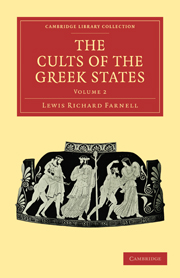Book contents
- Frontmatter
- Contents
- LIST OF PLATES IN VOL. II
- CHAPTER XIII ARTEMIS
- CHAPTER XIV ARTEMIS—UPIS—NEMESIS
- CHAPTER XV ADRASTEIA
- CHAPTER XVI HEKATE
- CHAPTER XVII MONUMENTS OF THE CULT OF ARTEMIS
- CHAPTER XVIII IDEAL TYPES OF ARTEMIS
- CHAPTER XIX HEKATE: REPRESENTATIONS IN ART
- CHAPTER XX EILEITHYIA
- CHAPTER XXI APHRODITE-WORSHIP
- CHAPTER XXII MONUMENTS OF APHRODITE
- CHAPTER XXIII IDEAL TYPES OF APHRODITE
- Plate section
CHAPTER XV - ADRASTEIA
Published online by Cambridge University Press: 03 May 2011
- Frontmatter
- Contents
- LIST OF PLATES IN VOL. II
- CHAPTER XIII ARTEMIS
- CHAPTER XIV ARTEMIS—UPIS—NEMESIS
- CHAPTER XV ADRASTEIA
- CHAPTER XVI HEKATE
- CHAPTER XVII MONUMENTS OF THE CULT OF ARTEMIS
- CHAPTER XVIII IDEAL TYPES OF ARTEMIS
- CHAPTER XIX HEKATE: REPRESENTATIONS IN ART
- CHAPTER XX EILEITHYIA
- CHAPTER XXI APHRODITE-WORSHIP
- CHAPTER XXII MONUMENTS OF APHRODITE
- CHAPTER XXIII IDEAL TYPES OF APHRODITE
- Plate section
Summary
Adrasteia, understood in the later period as the goddess of inevitable fate, came to be a sort of twin-sister of Nemesis, and so was occasionally connected with Artemis.
At Andros and Cos there was a joint worship of Adrasteia and Nemesis, and we find the two connected by Antimachus, the learned epic poet of the latter part of the fifth century, quoted by Strabo; in the drama of the fifth century, in the younger Attic comedy, in passages of the Anthology and of Lucian, the functions of the one goddess cannot easily be distinguished from those of the other; and in the later literature the identity is completely established. We need not look further than this for an explanation of the statement in Harpocration that Demetrius of Scepsis identified Adrasteia with Artemis, and for the presence of the statue of the former in the temple of Artemis Leto and Apollo at Cirrha, the divinities who brought down the due ‘nemesis’ on the Cirrhaeans.
But the origin of ʾΑδράστεια, which can be clearly traced, is independent of Nemesis. There is no doubt that it was a cult-name and probably a local title of Cybele detached at an early period. It was near Priapus, Cyzicus, and in the Troad, localities where Cybele was especially worshipped, that the cult of Adrasteia was established; in a fragment of the Phoronis she is scarcely distinguished from Cybele, being described as the mountain-goddess whose attendants were the Idaean Dactyli.
- Type
- Chapter
- Information
- The Cults of the Greek States , pp. 499 - 500Publisher: Cambridge University PressPrint publication year: 2010First published in: 1896



